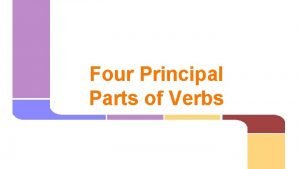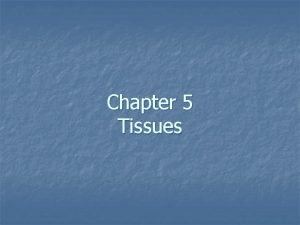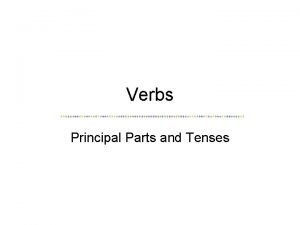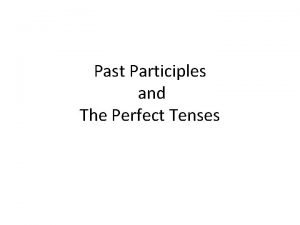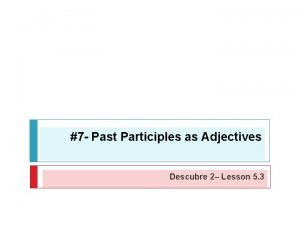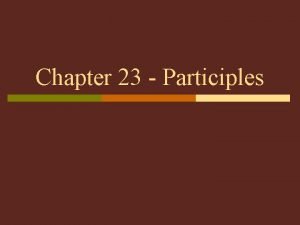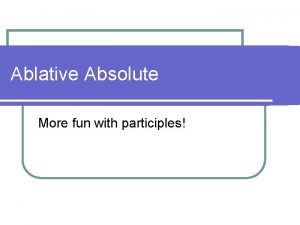Chapter 33 Participles Four principal parts of a














- Slides: 14

Chapter 33

Participles Four principal parts of a verb laudo 1 st person laudāre infinitive laudavi perfect stem laudatus participle stem present So far we have used the 4 th principle part of the verb to form the passive voice of the perfect system (perfect, pluperfect, future perfect) plus the forms of esse

Latin 1 st: 2 nd: 3 rd: English Latin English

We will also use the 4 th principal part of the participles verb to form ___________. Perfect Passive Participle Coquus vocatus ab omnibus laudatus est. The cook having been called was praised by all.

a. verbal ______, adjective A participle is a _______ noun it’s a verb that now describes a _______. It will agree with the noun it is describing case number and _____. gender in _______, ____ vocatus – from the verb vocare but now it is describing coquus

b. For now we will translate the perfect having been. . . passive participle as ________ c. The perfect passive participle is declined adjective just like an______ from the st/2 nd 1 _______ declension. Remember a verbal adjective participle is a ___________.

masculine nom. gen. dat. acc. abl. feminine neuter

Activity 2: 1. Fill in the blank in each of the following sentences with the perfect passive participle of the verb. Make the participle agree with the italicized noun in gender, case and number. Then translate the sentence. Ornamenta e fenestris __eiecta __ in viam ceciderunt. ornamenta: decl: _2 nd_ case: _nom. __ #: _plural_ gend: __neut. __ eicio, eicere: 4 th principal part ___eiectus___

2. Servi in urbem a dominā _____ panem et holera comparaverunt. servi: decl: _______ #: _____ gend: ____ case: _____ mitto, mittere: 4 th principal part _______

3. Aurelia glires a coquo ______ diligenter inspicit. glires: decl: _______case: ____ #: ______ gend: ____ paro, parāre: 4 th principal part _______

4. Servus soleas a convivis ______ diligenter custodit. soleas: decl: _______ #: _____ case: _____ gend: ____ depono, deponere: 4 th principal part ______

5. Coquus a Cornelio ______ e culinā festinavit. coquus: decl: _______ case: _____ #: _____ gend: ____ voco, vocāre: 4 th principal part ______

Activity 3: Underline the perfect passive participle, draw an arrow to the noun it is describing, translate sentence. 1. Convivae in triclinium ducti in lectis accubuerunt. 2. Servi a Gaio iussi frusta pulli fratri eius dederunt. 3. Porcus a servis scissus ad mensam portatus est.

4. Uvae in triclinium portatae omnibus convivis datae sunt. 5. Titus in triclinium ductus, “Salve, mi frater!” inquit.
 Principal parts and participles
Principal parts and participles What are the principal parts of verbs
What are the principal parts of verbs Bad verbs
Bad verbs Chapter 5 tissues
Chapter 5 tissues Principal parts of verbs latin
Principal parts of verbs latin Principal parts of regular and irregular verbs
Principal parts of regular and irregular verbs Irregular run
Irregular run Present tense rules chart
Present tense rules chart Principal parts of verbs examples
Principal parts of verbs examples Russian participles exercises
Russian participles exercises Cansar past participle
Cansar past participle He has ha hemos
He has ha hemos Infinitives and participles
Infinitives and participles Adjective past participle example
Adjective past participle example Verb vs verbal
Verb vs verbal

